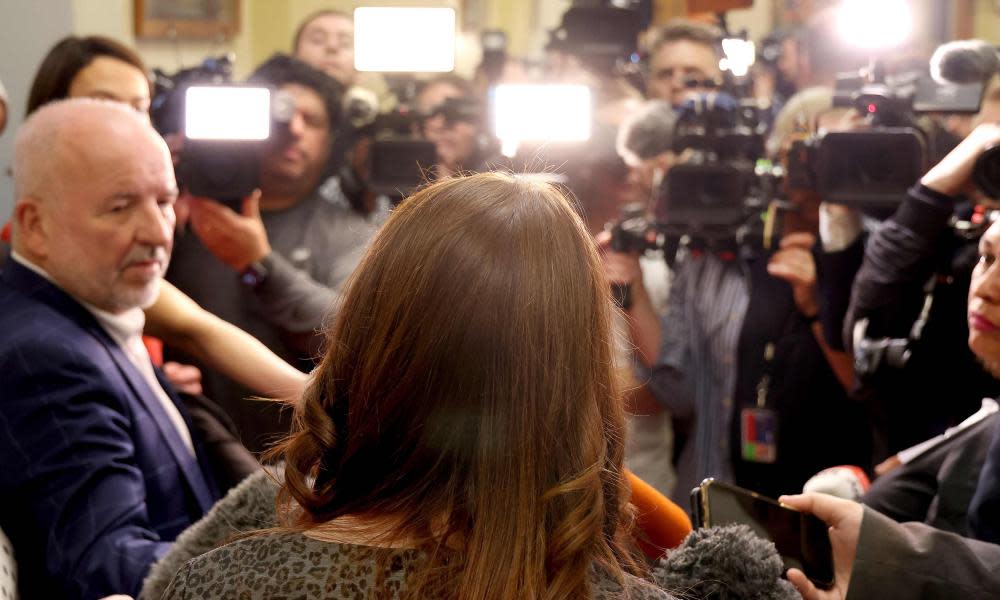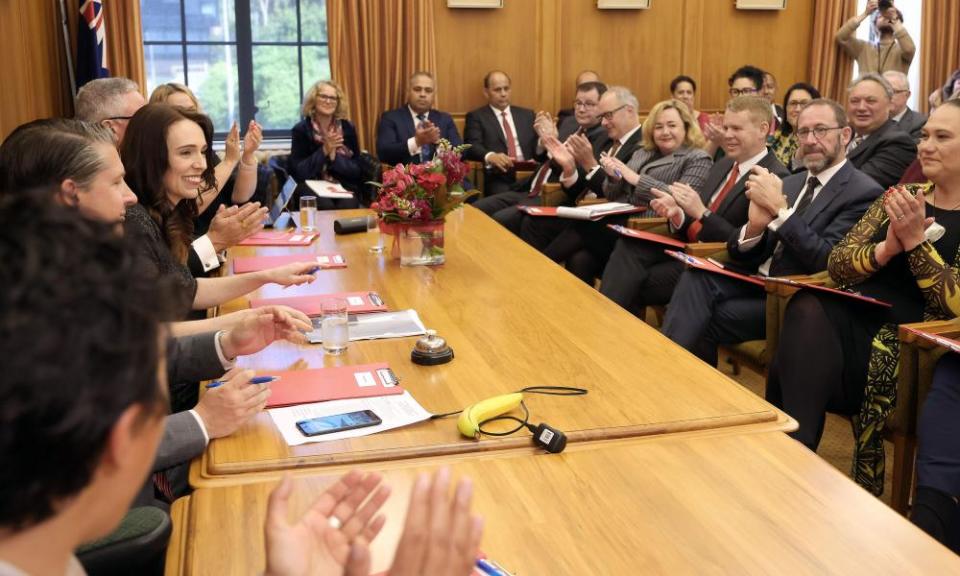NZ election weekly briefing: awaiting a Green new deal, Collins stays on, Jami-Lee roasted

Kia ora koutou.
Jacinda Ardern has called her first caucus meeting since her landslide victory at the weekend, addressing a room now packed with 64 MPs, as the nation awaits the outcome of the prime minister’s deliberations on a potential coalition.
On Tuesday, the prime minister said she would speak to Greens co-leaders James Shaw and Marama Davidson next week about “potential areas of co-operation” and would be in a position to officially form a government the week after that.
It was an emptier room for National leader Judith Collins after the loss of 21 seats, leaving them with just 35, but she remains upbeat. She told reporters the Nats planned to be “the best opposition ever”, adding: “I particularly relish the opportunity to hold the government to account.”
Collins appears to be staying on as leader, and so far no one has declared they will challenge her.
‘She’s earned it’
In Labour’s victory, Steve Braunias said New Zealanders recognised their “good luck” in their compassionate leader, recalling a moment in 2015 when Ardern – then the party’s rising star – expressed a wish that politics was more about love. “As prime minister,” Braunias writes, “she’s inspired it, and she’s earned it.”
With a clear mandate (and Winston Peters out of Parliament, ending a 40-year career), Ardern is free to deliver the transformative change she has promised. But expectations are high – not least from the blue voters turned red, as Radio New Zealand’s Tim Watkin points out (Stuff’s Kate Newton and Felippe Rodrigues have effectively visualised the shift). With so many portfolios up for grabs and roughly a third of the new parliament first-time MPs, RNZ’s political editor Jane Patterson predicts caucus management could prove challenging.
On current projections, Labour has won 64 of 120 parliamentary seats – three more than it needs to govern alone, Labour’s best result in 50 years and (as Stuff’s Richard Shaw explains) of any party under the MMP electoral system. As even Collins conceded, it was an “outstanding” mandate for Ardern’s new government; the question is, what she will do with it.
Ardern failed to deliver on some of her key pledges in her first term by ditching the KiwiBuild affordable housing scheme and a proposed capital gains tax, and making minimal headway on child poverty. Many blamed the coalition with New Zealand First as an impediment to progress – not to mention, successive challenges culminating in a global pandemic, as Claire Robinson notes.
Green power
The Greens won 7.6% of the vote, equating to 10 seats: two more than in 2017. The party also celebrated its first electorate win since 1999 with Chloe Swarbrick’s (preliminary) victory in Auckland Central.
Given that just weeks ago, polls showed the party as struggling to make 5%, the mood among supporters was of “people who feared the gallows but ended up with a bouquet”, reported Phil Taylor for the Guardian.
While Labour does not need the Greens to govern, Ardern may bring them in so as to capitalise on the party’s expertise and advance their shared goals. (Just don’t mention the wealth tax.) Shaw has told RNZ he expected their “constructive” relationship to continue in some kind of “shared programme”.
Ardern will also be under pressure to enact systemic changes to improve outcomes for Māori, with the unexpected show of support for the Māori party (and high turnout among Māori voters) interpreted as a sign that Labour has left many wanting.
“Tinkering around the edges will no longer cut it,” writes Leigh-Marama McLachlan for the Guardian. “Māori are now calling for much-needed systemic change to lift dire Māori outcomes.”
National disarray
One National supporter overheard on Saturday night summed up their result: “My drink needs a drink.”
Though Collins continues to be cheerful in defeat, her party returned only 27% of the vote, plummeting from 56 to 35 seats in the next parliament. The question is what next for the Nats, with the party’s board due to conduct a review of the campaign.
A National MP I just spoke to: “There is going to be blood on the floor next week. I’m not sure whose. Maybe everybody’s.”
— henry cooke (@henrycooke) October 17, 2020
A confidence motion on Collins’ leadership will be held after the new caucus is sworn in next month – but as Charlotte Graham-McLay reports, there is no obvious contender to replace her, with former leader Simon Bridges “not interested”, MP Mark Mitchell recently ruling it out, and Christopher Luxon a first-time MP.
According to party insider reports by the Spinoff, a new leader may not be a pressing concern for National as it seeks to present a united front in opposition (and elect a new president). Pollster David Farrar has suggested the party may not make any major moves until 2021.
Where National has floundered, Act has celebrated its best-ever election result, with 8% of the vote under David Seymour – hailed by some as the effective “leader of the opposition”.
After nearly a decade of being Act’s sole representative in parliament, Seymour will be joined by nine new faces – prompting speculation from former Act MPs Heather Roy and John Banks about how he will manage a caucus.
For now, he might be concentrating on learning their names, a test he recently failed.
What the polls said
The Roy Morgan poll released two days before the election came closest to picking the final result, predicting 47.5% of the party vote for Labour against a preliminary result of 49%.
A poll by Curia Market Research for Māori Television has shown 53% of voters on the Māori roll would vote yes in the euthanasia referendum.
Coming up
Preliminary referendum results for the cannabis reform and End of Life choice referendums will be revealed on 30 October.
The Electoral Commission intends to publish the full results of both the election and the referendums at 2pm on 6 November, with nearly 500,000 special votes yet to be counted.
The fate of the Māori party in particular is hanging on by a thread, with its candidate Rawiri Waititi (who is to take over from John Tamihere as co-leader) beating Labour’s Tamati Coffey in the Waiariki electorate by only 415 votes. The Spinoff’s Leonie Hayden has analysed the result.
Picture of the week

The quote
It was a good excuse to sneak out and go fishing.
Ardern’s partner, Clarke Gayford, on presenting home-cooked fish sliders (and venison bites) to journalists outside their home.
The tweet
New Zealand: An overwhelmingly female group of 22 new Labour MPs showing up for work 👏👏
Also:
- NZ's first African MP & Sri Lankan MP
- Labour to have more women than men in caucus for first time
- Largest new intake since 1935
- Largest Labour caucus ever
📸: @NZStuff pic.twitter.com/EOxJznaYST— Ashleigh Stewart (@Ash_Stewart_) October 19, 2020
The fact that both Labour and the Greens increased their votes has been hailed a significant progressive shift for Aotearoa – not to mention: the new parliament is set to be the most diverse ever, including 15 Māori MPs. RNZ has profiled some of the newcomers.
The moment
Newshub political editor Tova O’Brien has gone viral for her uncompromising interview with Jami-Lee Ross, the leader of the new Advance New Zealand party, which campaigned against Covid-19 restrictions, the United Nations, 5G and vaccinations (and had its party page removed by Facebook for spreading misinformation).
It speaks to the larger significance of Ardern’s victory as a blow against the conspiracist, right-wing and populist politics that have triumphed elsewhere in the world – and will be tested in the US next month.
“We are living in a polarised world … I hope in this election New Zealand has shown this is not who we are,” Ardern said on election night. “We are too small to lose sight of other people’s perspective.”
If you would like to relive the campaign, you can find the Guardian’s full New Zealand coverage here. Labour’s Kelvin Davis also captured the highlights in verse, in what Stuff’s John Weekes damned as a “convoluted, bizarre … rhyming speech” delivered on election night.
Thank you for following this historic election with us, and we hope to see you again in 2023. To quote Davis (a contender for deputy PM, if not Poet Laureate): “For now this is where my story will stop, with a final thank you to our whānau – every one of you lot.”

 Yahoo News
Yahoo News 
